Reverse Osmosis & Water Treatment in Malaysia
CHUNKE projects of Reverse Osmosis Water Treatment in Malaysia including different types of water treatment systems.
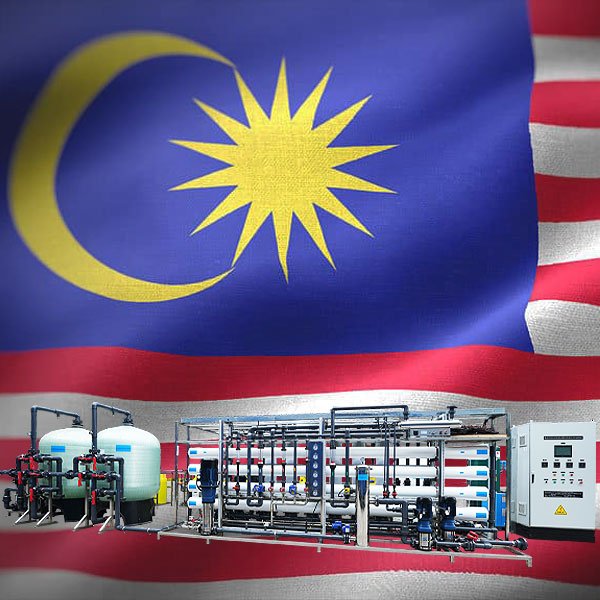
Malaysia is a country in Southeast Asia. The federal constitutional monarchy consists of thirteen states and three federal territories, separated by the South China Sea into two regions: Peninsular Malaysia and Borneo’s East Malaysia. Peninsular Malaysia shares a land and maritime border with Thailand and maritime borders with Singapore, Vietnam, and Indonesia. East Malaysia shares land and maritime borders with Brunei and Indonesia, as well as a maritime border with the Philippines and Vietnam.
Kuala Lumpur is the national capital, the country’s largest city, and the seat of the legislative branch of the federal government. Putrajaya is the country’s administrative centre, which represents the seat of both the executive branch (the Cabinet and federal ministries and agencies) and the judicial branch of the federal government. With a population of over 33 million, Malaysia is the world’s 43rd-most populous country. The southernmost point of continental Eurasia is Tanjung Piai. Located in the tropics, Malaysia is one of 17 megadiverse countries and home to numerous endemic species.
Total Renewable Water Resources in Malaysia
Between 1971 and 2020, Malaysia renewable water resources remained stable at around 580 billion cubic meters per year.
- Renewable surface water: 566 billion cubic meters per year
- Renewable groundwater: 64 billion cubic meters per year
- Renewable water resources per capita: 17,920 cubic meters per year
Water Treatment in Malaysia: A Comprehensive Guide
Water treatment plays a crucial role in ensuring access to clean and safe water for various purposes in Malaysia. With the growing concerns over water pollution and the need for reliable sources of pure water, the demand for effective water treatment solutions has been on the rise. So, in this comprehensive guide, we will explore the various aspects of water treatment in Malaysia, including the use of reverse osmosis technology, desalination, and industrial water treatment systems.
Meanwhile, CHUNKE provides wide range of filtration and economical solutions based on the Malaysia’s water resources. So, our water treatment in Malaysia becomes more popular accordingly.
- Surface water is water from river, lake which can be treated using different methods, such as Ultrafiltration Systems, Brackish Water RO accordingly.
- Desalination can be used for water from ocean, or sea source, which can be treated using Sea Water Reverse Osmosis Systems; Desalination Systems
- Ground Water or brackish water is from water located in the pore space of soil and rock “Borehole well”, which can be treated using Reverse Osmosis Systems, Borehole Water Filtration Systems, Well Water Filtration Systems, Chemical Dosing, UV Water Sterilizer accordingly.
- Government water supply, which could have high level of hardness or high level of chlorine, can be treated with Water Softener System, Media Water Filters.
CHUNKE Projects of Water Treatment in Malaysia
Meanwhile, CHUNKE designs and produces water treatment systems that meet the World Health Organization requirements. So, our water treatment in Malaysia is suitable for drinking.
CHUNKE has over 15 years of experience as a global provider of B2B water treatment solutions for a variety of applications and industries. Hence, we offer a large selection of all types of reverse osmosis, ultrafiltration, electrodeionization. And also, water treatment systems to meet your industrial needs accordingly. So, CHUNKE’s extensive global experience in engineering and manufacturing allows us to pre-engineer and customize water treatment and reverse osmosis systems to meet a wide range of customer requirements and specifications.
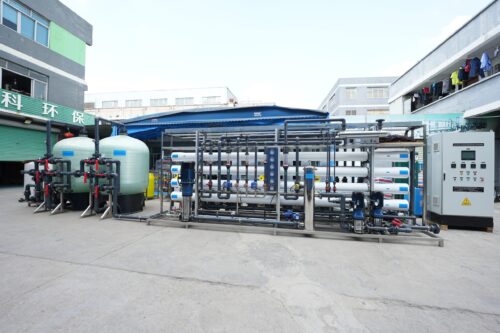
20TPH UF + 15TPH RO for Water Recycle Application
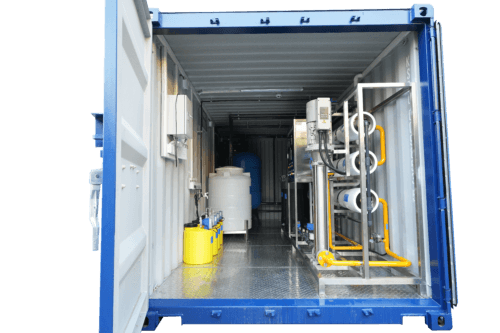
3000LPH Containerized Sea Water Desalination for Drinking
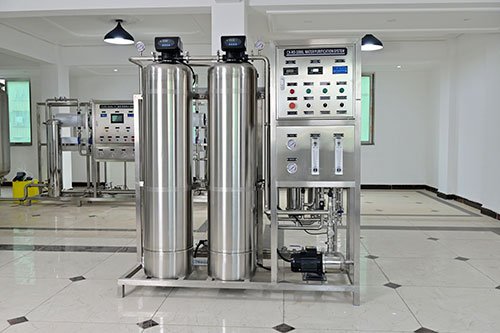
1000LPH Reverse Osmosis System for Drinking
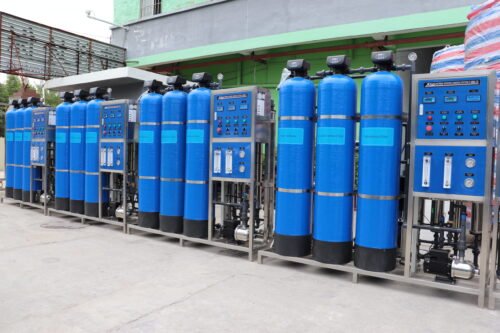
1000LPH Reverse Osmosis System for Water Filling Sitation
The Importance of Water Treatment in Malaysia
Malaysia is blessed with an abundant supply of water from its copiously flowing rivers and extensive network of dams for surface water storage. However, the increasing human population, industrial growth, and agricultural activities, particularly rice farming, pose significant challenges in maintaining the quality and availability of clean water. Hence, water pollution from domestic sewage and industries further exacerbates these challenges, necessitating effective water treatment measures.
Reverse Osmosis: Purifying Water for Various Applications
One of the most widely used methods of water treatment in Malaysia is reverse osmosis (RO). So, this process involves forcing water through a semi-permeable membrane to remove dissolved inorganic solids such as salts, bacteria, and microorganisms. Meanwhile, RO is particularly effective in treating seawater and brackish water, making it a valuable technology for water desalination.
Reverse osmosis systems consist of multiple stages, each designed to remove specific contaminants and improve water quality. So, the first stage involves a pre-filter that removes solid materials like silt, rust, and dirt, preventing clogging of the subsequent filters. Hence, the second and third stages feature a reverse osmosis membrane and carbon filters, which effectively remove chlorine and other impurities, resulting in clear and pure water.
Desalination: Meeting the Demand for Freshwater
As a country surrounded by the sea, Malaysia also faces the challenge of providing freshwater to meet the growing demand. So, desalination, a process that converts seawater into freshwater, has emerged as a viable solution. So, seawater reverse osmosis systems are used to remove salts and other impurities from seawater, producing high-quality potable water.
Desalination systems utilize advanced technologies such as reverse osmosis and electrochemical processes to separate the salt and other contaminants from the water. These systems can be implemented on a large scale to cater to the needs of coastal communities, industries, and agricultural sectors that require a reliable source of freshwater.
Industrial Water Treatment Systems
In addition to providing clean drinking water, water treatment is also essential for various industrial processes. Industries such as pharmaceuticals, food and beverage, power generation, and manufacturing require pure water for their operations. Industrial reverse osmosis systems are specifically designed to meet the stringent requirements of these sectors, ensuring the supply of high-quality water.
Industrial water treatment systems often incorporate additional technologies such as electrodeionization (EDI) to further enhance water purity. EDI is an electrochemical process that removes ionized impurities from water, making it suitable for critical industrial applications. These systems are designed to handle large volumes of water and can be customized to meet specific industry requirements.
Ensuring Pure Water for the Pharmaceutical Industry
As the demand for clean water continues to increase, it is essential to adopt sustainable water treatment solutions. Malaysia has been actively exploring innovative approaches to water treatment, such as the use of advanced filtration systems and the implementation of water reuse and recycling programs. These initiatives aim to minimize water wastage and ensure the long-term availability of clean water.
Sustainable Water Treatment Solutions
As the demand for clean water continues to increase, it is essential to adopt sustainable water treatment solutions. So, Malaysia has been actively exploring innovative approaches to water treatment, such as the use of advanced filtration systems and the implementation of water reuse and recycling programs. These initiatives aim to minimize water wastage and ensure the long-term availability of clean water, accordingly.
The Role of Government and Regulatory Bodies
The Malaysian government plays a crucial role in regulating and overseeing water treatment practices in the country. Hence, regulatory bodies such as the Department of Environment (DOE) and the National Water Services Commission (SPAN) enforce standards and guidelines to ensure the quality and safety of treated water. These bodies work closely with water treatment companies and industry stakeholders to promote best practices and continuous improvement in water treatment processes.
Leading Water Treatment Companies in Malaysia
Several reputable water treatment companies operate in Malaysia, offering a wide range of products and services. These companies specialize in designing, manufacturing, and installing water treatment systems tailored to meet the specific needs of various industries and applications. Some of the prominent players in the Malaysian water treatment market include: Chunke Water Treatment.
Future Trends and Innovations in Water Treatment
The field of water treatment is continually evolving, with ongoing research and development aimed at improving efficiency, sustainability, and cost-effectiveness. So, emerging technologies such as membrane bioreactors, advanced oxidation processes, and nanofiltration are being explored to address water treatment challenges more effectively. Additionally, digitalization and automation are transforming the water treatment industry, enabling real-time monitoring and optimization of water treatment processes.
Water treatment plays a vital role in ensuring the availability of clean and safe water for various purposes in Malaysia. So, reverse osmosis systems, desalination technologies, and industrial water treatment solutions are instrumental in meeting the diverse needs of the country. Hence, with a focus on sustainability and innovation, Malaysia continues to make significant strides in water treatment, ensuring a reliable supply of pure water for its growing population and industries.
Chunke Water Treatment‘s expertise in producing high-quality reverse osmosis systems has contributed to improving water treatment capabilities in Malaysia. So, their reliable and efficient RO plants have been implemented in various projects across the country, ensuring access to clean and safe drinking water.
